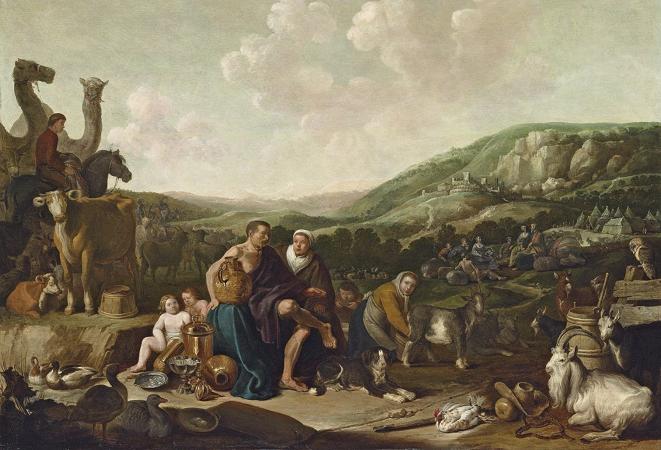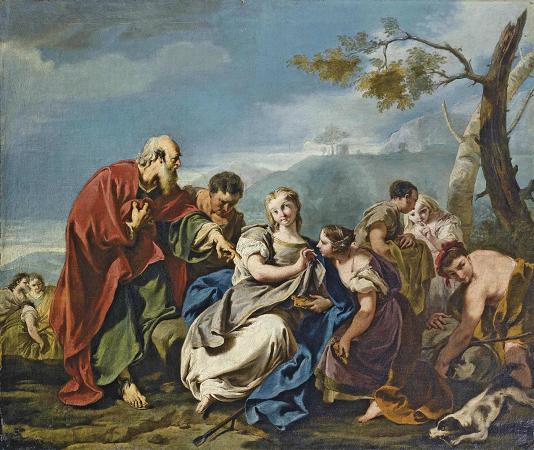Rachel. Rachel was a Biblical figure, the favorite of Jacob's two wives, and the mother of Joseph and Benjamin, two of the twelve progenitors of the tribes of Israel. Rachel's father was Laban. Her older sister was Leah, Jacob's first wife. Her aunt Rebekah was Jacob's mother. Rachel is first mentioned in the Hebrew Bible in Genesis 29 when Jacob happens upon her as she is about to water her father's flock. She was the second daughter of Laban, Rebekah's brother, making Jacob her first cousin. Jacob had traveled a great distance to find Laban. Rebekah had sent him there to be safe from his furious twin brother, Esau. During Jacob's stay, he fell in love with Rachel and agreed to work six years for Laban in return for her hand in marriage. On the night of the wedding, the bride was veiled and Jacob did not notice that Leah, Rachel's older sister, had been substituted for Rachel. Whereas Rachel was lovely in form and beautiful, Leah had tender eyes. Later Jacob confronted Laban, who excused his own deception by insisting that the older sister should marry first. He assured Jacob that after his wedding week was finished, he could take Rachel as a wife as well, and work another six years as payment for her. When God saw that Leah was unloved, he opened her womb, and she gave birth to four sons. Rachel, like Sarah and Rebecca, remained unable to conceive. According to Tikva Frymer-Kensky, The infertility of the matriarchs has two effects: it heightens the drama of the birth of the eventual son, marking Isaac, Jacob, and Joseph as special; and it emphasizes that pregnancy is an act of God. Rachel became jealous of Leah and gave Jacob her maidservant, Bilhah, to be a surrogate mother for her. Bilhah gave birth to two sons that Rachel named and raised. Leah responds by offering her handmaid Zilpah to Jacob, and names and raises the two sons that Zilpah bears. According to some commentaries, Bilhah and Zilpah are actually half-sisters of Leah and Rachel. After Leah conceived again, Rachel was finally blessed with a son, Joseph, who would become Jacob's favorite child. Rachel's son Joseph was destined to be the leader of Israel's tribes between exile and nationhood. This role is exemplified in the Biblical story of Joseph, who prepared the way in Egypt for his family's exile there. After Joseph's birth, Jacob decided to return to the land of Canaan with his family. Fearing that Laban would deter him, he fled with his two wives, Leah and Rachel, and twelve children without informing his father-in-law. Laban pursued him and accused him of stealing his idols. Indeed, Rachel had taken her father's idols, hidden them inside her camel's seat cushion, and sat upon them. Laban had neglected to give his daughters their inheritance. Not knowing that the idols were in his wife's possession, Jacob pronounced a curse on whoever had them: With whoever you will find your gods, he will not live. Laban proceeded to search the tents of Jacob and his wives, but when he came to Rachel's tent, she told her father, Let not my lord be angered that I cannot rise up before you, for the way of women is upon me. Laban left her alone, but the curse Jacob had pronounced came true shortly thereafter. Near Ephrath, Rachel went into a difficult labor with her second son, Benjamin. The midwife told her in the middle of the birth that her child was a boy. Before she died, Rachel named her son Ben Oni, but Jacob called him Ben Yamin. Rashi explains that Ben Yamin either means son of the right, since Benjamin was the only one of Jacob's sons born in Canaan, which is to the south of Paddan Aram; or it could mean son of my days, as Benjamin was born in Jacob's old age. Rachel was buried on the road to Efrat, just outside Bethlehem, and not in the ancestral tomb at Machpelah. Today a site claimed to be Rachel's Tomb, located between Bethlehem and the Israeli settlement of Gilo, is visited by tens of thousands of visitors each year. Rachel's tomb is said to be in the ancient city of Zelzah in the land of the Tribe of Benjamin. Mordecai, the hero of the Book of Esther, and Queen Esther herself, were descendants of Rachel through her son Benjamin. The Book of Esther details Mordecai's lineage as Mordecai the son of Yair, the son of Shimi, the son of Kish, a man of the right. The designation of ish yemini refers to his membership in the Tribe of Benjamin. The rabbis comment that Esther's ability to remain silent in the palace of Ahasuerus, resisting the king's pressure to reveal her ancestry, was inherited from her ancestor Rachel, who remained silent even when Laban brought out Leah to marry Jacob.
more...






